Historically, most of Malawi’s food has been produced by small-scale farmers operating on less than one acre. With poorly developed supply chains, persistent droughts and suboptimal crop yields, food production is largely characterized by subsistence farming. These challenges to subsistence farming are further exacerbated by increasingly common climate extremes, inadequate crop diversification, overdependence on rainfed agriculture, and pests and diseases. These conditions are taking a toll on nutrition in the country: the 2017 Malawi Vulnerability Assessment Committee report highlighted rising levels of vitamin A deficiency among pregnant women, lactating mothers and children under 5 years. The need to scale up interventions targeting vulnerable groups is significant.
Why sweetpotato?
The introduction of the biofortified orange-fleshed sweetpotato (OFSP) as part of healthy diets is part of a proven solution towards addressing malnutrition in Africa and other low-income regions. Just 125g of biofortified OFSP meets the daily vitamin A requirement for children under 5. New and improved varieties offer endless possibilities to smallholder farmers as they are high-yielding, drought tolerant, early maturing and with a high dry matter content—a preferred trait among households due to the starchiness and mealy texture that fills up tummies quickly. Ultimately, Malawian farmers can exploit opportunities for improved livelihoods along the sweetpotato value chain from its production to marketing, processing, and utilization.
Since 2019, the Technologies for African Agricultural Transformation (TAAT) project has been working to extend these benefits to at least 1.5 million people in 12 African countries, including Malawi. Early results indicate at least 300,000 beneficiaries are already producing and consuming biofortified sweetpotato in these countries thanks to TAAT interventions.
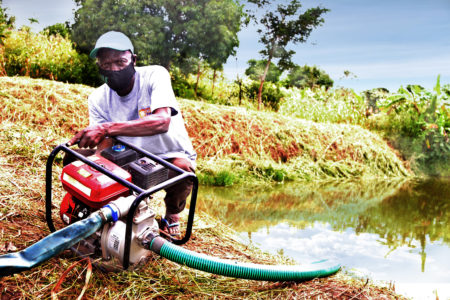
In Malawi, as in other countries, TAAT continues to build upon progress made by the International Potato Center (CIP) and its partners since 2009. Through these early initiatives 500,000 beneficiaries have adopted biofortified sweetpotatoes leading to improved nutrition outcomes and livelihoods for rural and urban families. TAAT’s entry point has been to equip 20 percent of vine producers in Malawi with skills and simple irrigation facilities to ensure availability of improved sweetpotato varieties for another 40% of sweetpotato farmers at the onset of each planting season. Irrigation has made it possible for vine multipliers to intensify their production of both vines and sweetpotato roots all year long.
For these early adopters, the results are already evident. Many are now able to pay for school fees, buy uniforms for their children, and seek medical attention when needed. Others are purchasing bicycles and oxcarts to facilitate their movement and access to markets in urban centers. For others, the additional income has enabled business diversification into new ventures like internet cafes and computer centers.
With support from the International Water Management Institute (IWMI) and CIP, three demonstration sites have been established to equip farmers with skills on simple irrigation technologies for off-season production of biofortified sweetpotato vines. Subsequently, some vine multipliers have expanded their cultivated area and vine production by 60% while also diversifying their crops to boost production.
Lead farmers show the way
TAAT and CIP selected the southern region of the country for this project as many farmers in this area were already producing OFSP roots and vines. To build upon this base, they leveraged support from other development partners (including USAID, Irish Aid and FCDO) to optimize the gains and use of resources.
In February 2019, CIP and IWMI selected three sites where they could demonstrate how to produce quality vines using simple irrigation technologies. They recruited farmers who had available farmland, easy access to water, and who expressed a willingness to work with CIP producing vines. Irrigation equipment on these sites was provided by IWMI while CIP supplied the farmers with clean, improved biofortified sweetpotato varieties, including training on good agronomic practices, marketing, and utilization of the crop (Photos 1 and 2).
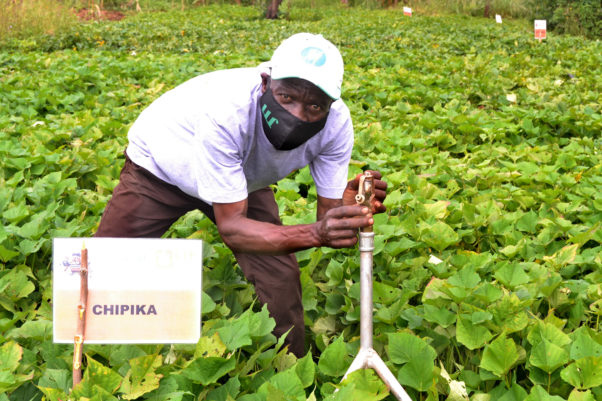
Sweet(potato) results
Maxwell Nkhoma in Zomba is one success story of many. After installing irrigation and tripling the area devoted to sweetpotato on his farm, he has increased his income 196% (from USD 4,230 to 8,292) within two years thanks to a ready market. Maxwell sells the vines to NGOs, government departments and private companies who then redistribute the vines to farmers. He employs six young people with permanent work on his farm and hires casual labourers during peak seasons.
While Maxwell reinvests some of the proceeds on his farm, he channels some of the profits towards the needs of his family such as payment of school fees. He has just completed a three-bedroom house (Photo 3).
Of vine multipliers supported by CIP in Malawi in previous years, TAAT is following up with at least 20% of these farmers (including Nkhoma), providing access to clean vines for larger-scale production, equipment, and training opportunities.
“When I see these OFSP vines, I see good money,” Maxwell said as he inspected his vines.
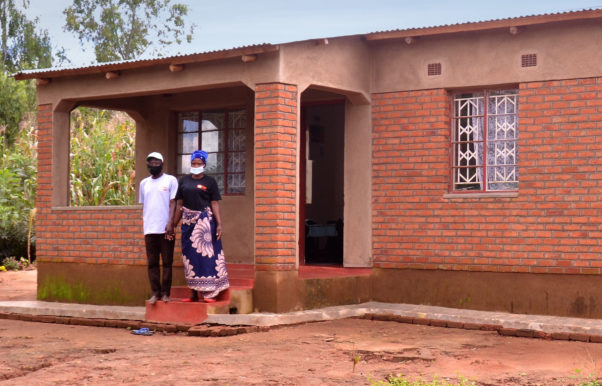
TAAT beneficiaries also train local farmers in their communities and hold demonstrations each year to showcase new biofortified sweetpotato varieties and technologies. Such field days target to reach at least 2,000 people each year, primarily women, including farmers, local researchers, extension workers, and equipment suppliers.
One such beneficiary was Evalista Liphete of James Village in Chiradzulu. She planted biofortified sweetpotato vines with a focus on root production on a quarter hectare of land and earned USD 230. With these proceeds, Liphete bought a bicycle, a mattress and three goats, which have now increased to seven.
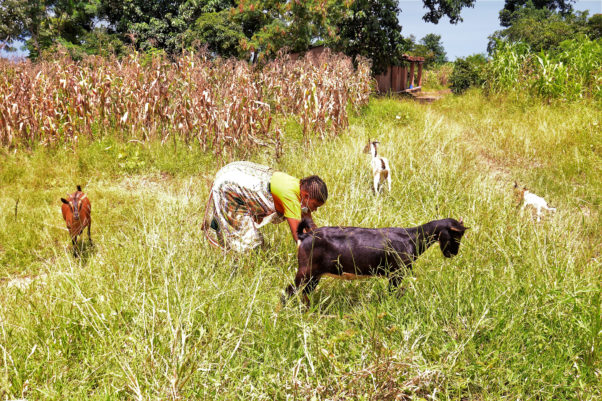
Since taking on vine production, Liphete has expanded to one acre the amount of land dedicated to sweetpotato production. She has already sold nine 90kg bags for a total of USD 280 to vendors and delivered 1,157kgs Mothers Holdings from the crop, a private company that sells sweetpotato bread among its bakery products. She plans to buy iron sheets for her house, a sofa and kitchen utensils. Her favorite biofortified varieties are Mathuthu, Chipika, Kadyaubwerere and Royal Choice. These varieties are not only high yielding but also preferred by commercial processors because their low fiber content makes them easier to process with machines.
“Not only does sweetpotato give us income, but many households also consume them as we await other crops to mature during the January and March cropping calendars,” said Liphete.
Her sentiments were echoed by fellow root grower, Elias Kalipawo, from the same district: “We have discovered that the secret of getting high yields lies in early planting of improved varieties We can do that now because the vines are available at the beginning of the rainy season.”
The Food and Agriculture Organization (FAO) has reported that school meals increase enrollment, improve nutrition and encourage attendance. With this idea in mind, TAAT partnered with NASCENTS Solutions to promote the OFSP production in 46 primary schools across the country. Each school receives an average of 20 vine bundles (100 stems), enough to grow enough OFSP to feed at least 100 school learners once a day for three months. These school gardens act as demonstration plots for learners and surrounding community members and they have inspired parents and school committees to produce roots for use in school meal programs.
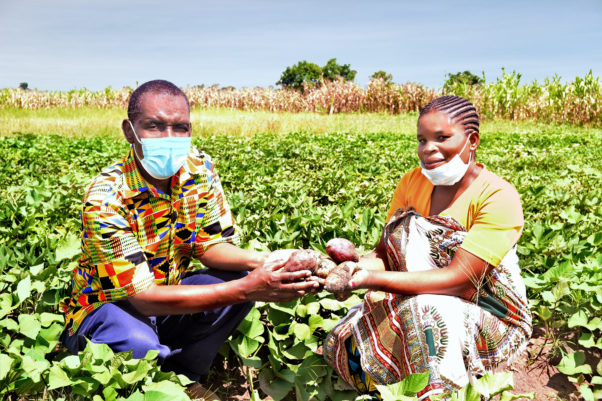
To improve knowledge about the value of OFSP, the project distributed education and communication materials during farmer and extension staff training sessions. Messages were placed on radio, social media, television and newspapers to create awareness of and demand for biofortified sweetpotato.
The overall objective of this project is to scale up sweetpotato production, processing and marketing in Malawi and other African countries. This more diversified sector will help deliver more nutritious foods to rural and urban populations, especially the poor. By equipping farmers with knowledge and tools to facilitate year-round production of sweetpotato, TAAT is catalyzing improved incomes, diets and livelihoods of targeted communities. These technologies have been an eye opener for farmers, sweetpotato vendors, schools, communities, equipment distributors and commercial processors. Linkages among stakeholders need to be strengthened, increasing availability of clean planting material, ready market information and extension services. The new technologies are being adopted by increasing numbers of farmers even if there are prevailing challenges such as Covid-19.
The Malawi team is helping government extension workers reach more farmers and disseminate new technologies that promote year-round production. TAAT is also accelerating market linkages between farmers and commercial processors. Biofortified sweetpotato planting material is now increasingly available. With greater availability of higher quality vines and improved access to markets, more men, women and the youth are becoming engaged. Government extension workers, who work closely with CIP researchers, are advising farmers to rotate sweetpotato with crops such as legumes, maize, pigeon peas to rejuvenate the soil prevent pests and ensure families access nutritious food baskets.
Contacts: Wells Kumwenda (w.kumwenda@cgiar.org)
